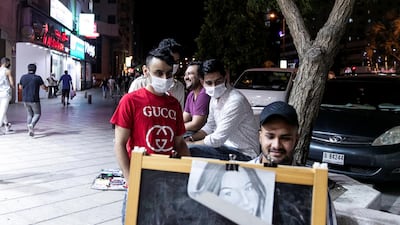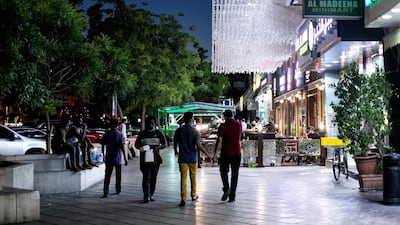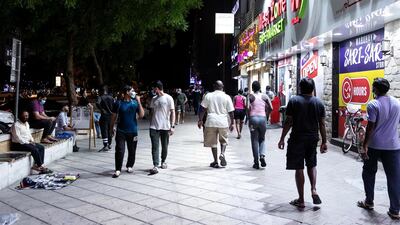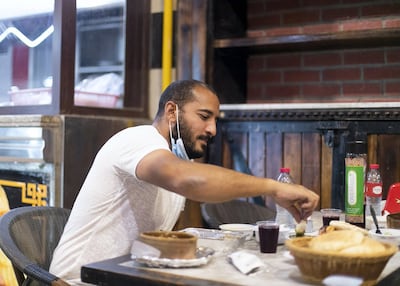One night in late January, news broke of the first coronavirus case in the UAE.
Inside Al Safadi Restaurant on Rigga Street, patrons continued to smoke their shisha pipes and share platters of grilled meats.
When patrons stepped outside, Rigga Street was transformed. Within two hours of the news, everyone wore a face mask and the street’s relaxed atmosphere turned sombre.
In late March, the boulevard known for its street life and restaurants, in the older part of Dubai, grew dark as a four-week lockdown started and businesses closed.
But the lifting of movement restrictions, unseasonable cool weather and Ramadan iftars have brought people back to the boulevard’s famed restaurants and cafes.
In the evening, people gather on benches in small groups to sip tea and chat under leafy trees.
On Tuesday night, a street artist gathered onlookers as he sketched portraits. Near by, a young girl played the wooden flute.
Life had returned to Rigga Street.
Saeed El Orabi and his cousin Mustafa sat down at a busy restaurant on Tuesday night to share an iftar of stewed potatoes, molokhia and chilled hibiscus juice.
Mr El Orabi returned home to Rigga Street a few days earlier after a month’s duty as a security guard at a field hospital on the outskirts of Abu Dhabi.
To celebrate, he invited his cousin to Rigga Street.
“We took a chance because of this amazing weather,” said Mr El Orabi, 38. “And we cannot cook. I only know how to cook tea.”
He has taken a 30 per cent pay cut because of the pandemic and three of his cousins went home to Egypt in late March on the last flight out.
Mr El Orabi has not considered leaving the UAE because the pandemic’s consequences are global.
“It’s around the world, not only here,” he said.
Tens of thousands of residents have gone home after losing work.
Dark shopfronts punctuate Rigga Street’s bright lights – florists, travel agencies, shisha cafes, small hotels and nightclubs that may never reopen.
Others are open, waiting for customers who never appear.
“There is no business all day,” said Akshay Korwani, 24, a clerk at Mega Star Jewellers.
“We call customers and tell them about offers. They’re not even interested. They don’t even have a salary right now.”
At the entrance of Rigga Street, the gates of the Port Saeed mosque remain shut.
During Ramadan, the mosque usually fills with 1,700 worshippers and hundreds more spill on to the surrounding streets to break their fast and pray together at sunset.
This year, the call to prayer commands worshippers to stay home.
“We pray in our homes and, praise to God, the rewards will be the same,” said Mohammed Al Hasan, 27, son of the mosque’s imam.
“Allah is testing us right now and the whole Earth is a place for prayer.”
On Tuesday evening, Mr Al Hasan stood beside his father at the mosque’s mihrab as his father made a call to prayer that reverberated through the empty hall.
They broke their fast with water and dates at the back of the vacant mosque.
Mr Al Hasan is also an imam, at a nearby mosque, and a chemical engineer.
These days, he counsels members of his congregation over WhatsApp and performs prayers with his family of five in their home behind the mosque.
They considers it a moral obligation to stay home.
It is a busier scene down the road outside the Diva Gents Saloon, where half a dozen barbers wait for customers.
Business is down 70 per cent. Few people have the disposable income for a haircut.
“Their wives are doing it,” says Ammar Abdul Qadr, 32, a Syrian barber. “They’re watching programmes on YouTube.”
Mr Abdul Qadr was reluctant to return to work. His wife, children and father live in Umm Al Quwain and he has stopped visiting them to keep them safe. He stays with four Syrian colleagues on Rigga Street.
The barbershop chairs were empty but clients will return, Mr Abdul Qadr said.
“They’ll come back because people miss socialising," he said.
"A barber is a friend and they’ll come to say hello and socialising will bring them back. They love kinship and need friendship.”
His colleague, Ali Talib, nodded: “You’ll come back here one day and you’ll feel the atmosphere of Rigga again.”

















